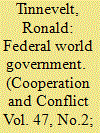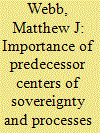| Srl | Item |
| 1 |
ID:
113732


|
|
|
|
|
| Publication |
2012.
|
| Summary/Abstract |
Within contemporary legal and political philosophy there is nothing more unpopular than defending a world state. It seems food for thought for writers like Huxley or Wells, but not a topic that deserves serious philosophical reflection. Fortunately, there are exceptions to this general rule. Theorists such as Höffe, Cabrera, Deudney and Yunker defend a version of a multilayered minimal world state - a model based on the dual principles of federalism and subsidiarity. The focus of this article is on the very fragile balance that proponents of this model have to keep between a simultaneous need for centralization and decentralization. On the basis of a critical analysis of the work of these theorists, it is argued in this article that the safeguards these authors defend to prevent a bloating of government themselves contain a tendency to hierarchical centralization. While some form of world state might be necessary to cope with the challenges posed by globalization, it is essential to discuss the shape and competences of the world state much more critically and in more detail than has been the case in the past.
|
|
|
|
|
|
|
|
|
|
|
|
|
|
|
|
| 2 |
ID:
137936


|
|
|
|
|
| Summary/Abstract |
A range of theories have sought to explain and predict secession with varying degrees of success. Arguing that a disproportionate focus upon the seceding group as the unit of analysis has frustrated the development of a comprehensive theoretical framework that is universally valid, this article highlights the role of predecessor institutions of governance and the failure of states to successfully incorporate these as an important, but neglected, causal factor in the study of secession. The inclusion of pre-state institutions of governance and processes of state formation not only results in a more complete, and therefore accurate, explanatory account of secession, but also explains why some regions have been more prone to secession than others.
|
|
|
|
|
|
|
|
|
|
|
|
|
|
|
|